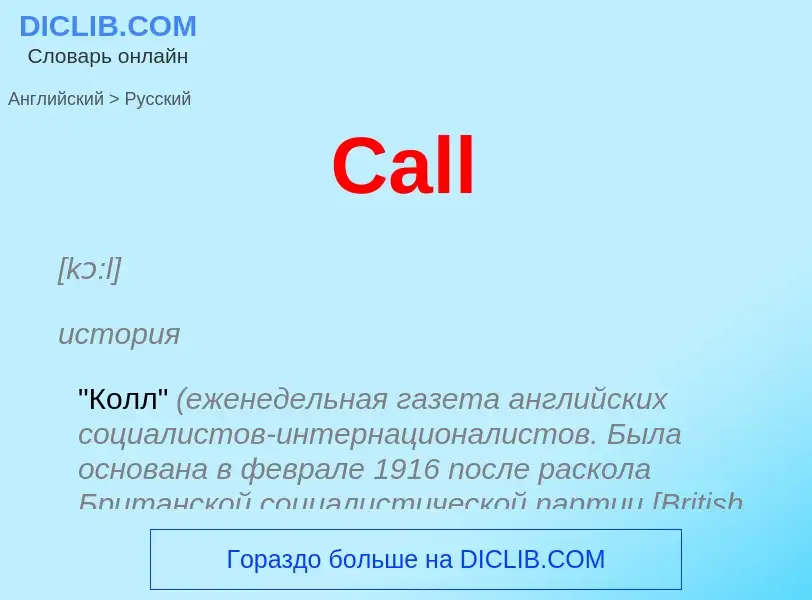Перевод и анализ слов искусственным интеллектом ChatGPT
На этой странице Вы можете получить подробный анализ слова или словосочетания, произведенный с помощью лучшей на сегодняшний день технологии искусственного интеллекта:
- как употребляется слово
- частота употребления
- используется оно чаще в устной или письменной речи
- варианты перевода слова
- примеры употребления (несколько фраз с переводом)
- этимология
call - перевод на русский
[kɔ:l]
история
"Колл" (еженедельная газета английских социалистов-интернационалистов. Была основана в феврале 1916 после раскола Британской социалистической партии [British Socialist Party]; выходила до 1920)
[kɔ:l]
общая лексика
крик (животного, птицы)
призыв
сигнал
манок (для приманивания животных)
вызов, обращение
в первых процедурных языках программирования (Фортран, ПЛ/1) существует оператор call, передающий управление процедуре. В более поздних языках процедуры стали вызываться просто по имени
телефонный вызов, телефонный звонок
вызов
вызывать
разговор
телефонное соединение
заход
заходить
требование
заявка
запрос
звонить
требовать
запрашивать
медицина
вызов (врача)
существительное
[kɔ:l]
общая лексика
крик
голос (животного, птицы)
зов
оклик
сигнал
звонок
свисток
«дудка» (на корабле)
сбор (барабанный)
перекличка
призыв
вызов (в суд и т. п.)
(официальное) приглашение на работу
должность и т. п.
предложение занять должность и т. п.
созыв (совещания и т. п.)
телефонный вызов
звонок или разговор
объявление о времени репетиции
тяга
влечение
призвание
визит
посещение
приход
заход (корабля в порт)
остановка (поезда на станции)
требование
полномочие
право
нужда
необходимость
зов, оклик
призвание, влечение
визит, посещение
заход (парохода) в порт
остановка (поезда) на станции
приглашение
предложение (места, кафедры и т. п.)
спрос
нужда, необходимость
манок, дудка (птицелова)
охота
манок
вабик (для приманки птиц)
американизм
решение национального комитета партии о созыве съезда для выдвижения кандидатур
прослушивание
репетиция
экономика
спрос (на товар)
коммерция
требование уплаты долга
очередного взноса и т. п.
военное дело
заявка
вызов
биржевое выражение
предварительная премия
опцион
сделка с предварительной премией
карточный термин
объявление (козырной масти)
церковное выражение
предложение прихода
места пастора
вычислительная техника
обращение (к подпрограмме)
глагол
общая лексика
кричать
закричать
звать
позвать
подозвать
окликать
будить
разбудить
называть
выкликать
громко читать список и т. п.
созывать
вызывать
звать (к себе)
приглашать
давать сигнал
сигнализировать
вызывать (откуда-л.)
(on
upon
unto
to) призывать
взывать
обращаться
upon) предоставлять слово
вызывать на трибуну
upon) вызывать учащегося ответить на вопрос преподавателя
to) быть призванным
чувствовать призвание
потребность
to) быть вынужденным
объявлять
оглашать
(обыкн. in
at
on
round) навещать
посещать
приходить в гости
с визитом
заходить
заглядывать
завернуть (куда-л.)
(in
at) заходить (о корабле)
at) останавливаться (о транспорте)
(for)
заходить (за чем-л., кем-л.)
(громко) требовать
требовать
нуждаться (в чём-л.)
предусматривать
требоваться
быть нужным
уместным
звонить или говорить по телефону
считать
рассматривать
(пред)полагать
давать имя
вызывать, призывать
заходить, навещать
приводить в действие
охота
вабить
приманивать птиц
Шотландия
гнать (стадо, повозку и т. п.)
погонять
понукать
синоним
- automatic call
- bad call
- ciphered call
- confidentional call
- false call
- hard-to-trace call
- priority call
- secure call
- selective call
Определение
Википедия
Computer-assisted language learning (CALL), British, or Computer-Aided Instruction (CAI)/Computer-Aided Language Instruction (CALI), American, is briefly defined in a seminal work by Levy (1997: p. 1) as "the search for and study of applications of the computer in language teaching and learning". CALL embraces a wide range of information and communications technology applications and approaches to teaching and learning foreign languages, from the "traditional" drill-and-practice programs that characterised CALL in the 1960s and 1970s to more recent manifestations of CALL, e.g. as used in a virtual learning environment and Web-based distance learning. It also extends to the use of corpora and concordancers, interactive whiteboards, computer-mediated communication (CMC), language learning in virtual worlds, and mobile-assisted language learning (MALL).
The term CALI (computer-assisted language instruction) was in use before CALL, reflecting its origins as a subset of the general term CAI (computer-assisted instruction). CALI fell out of favour among language teachers, however, as it appeared to imply a teacher-centred approach (instructional), whereas language teachers are more inclined to prefer a student-centred approach, focusing on learning rather than instruction. CALL began to replace CALI in the early 1980s (Davies & Higgins 1982: p. 3) and it is now incorporated into the names of the growing number of professional associations worldwide.
An alternative term, technology-enhanced language learning (TELL), also emerged around the early 1990s: e.g. the TELL Consortium project, University of Hull.
The current philosophy of CALL puts a strong emphasis on student-centred materials that allow learners to work on their own. Such materials may be structured or unstructured, but they normally embody two important features: interactive learning and individualised learning. CALL is essentially a tool that helps teachers to facilitate the language learning process. It can be used to reinforce what has already been learned in the classroom or as a remedial tool to help learners who require additional support.
The design of CALL materials generally takes into consideration principles of language pedagogy and methodology, which may be derived from different learning theories (e.g. behaviourist, cognitive, constructivist) and second-language learning theories such as Stephen Krashen's monitor hypothesis.
A combination of face-to-face teaching and CALL is usually referred to as blended learning. Blended learning is designed to increase learning potential and is more commonly found than pure CALL (Pegrum 2009: p. 27).
See Davies et al. (2011: Section 1.1, What is CALL?). See also Levy & Hubbard (2005), who raise the question Why call CALL "CALL"?

